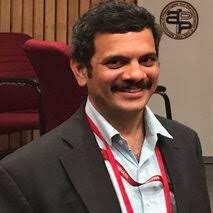Talk Details
Title : Yoga and cardiorespiratory regulation

Dr. Kaviraja Udupa
NIMHANS
Abstract:
Yogis prepare the body and mind to attain higher levels of consciousness by controlling the autonomic nervous system (ANS) and tend to use the respiratory system, which being semi-voluntary in nature acts as the key to attaining this voluntary control over the ANS. Heart Rate Variability (HRV), which computes the instantaneous changes in heart rate over time, is a good measure of cardiac autonomic balance. It is imperative to have respiration under normal pattern (12-15 breaths/min taking 5-6 seconds for each respiratory cycle) to compute Sympatho-Vagal Balance (SVB) which measures the neuro-cardiac control through these two limbs of ANS.
In this review, we summarize several research studies undertaken at NIMHANS and other institutions demonstrating modulation of sympathovagal balance through the practice of pranayama, based on the frequencies of breathing (slow vs fast), patterns of breathing, special breathing techniques in healthy subjects as well as in various neurological and psychiatric conditions. Further, we also discuss specific nostril breathing using HRV measures, to demonstrate how Surya (right) and Chandra (left) Nadi control the two limbs of ANS, thus attaining ideal SVB. In addition to the modulation of autonomic functions, other possible mechanisms will also be discussed based on other parameters employed in these studies such as neurophysiological measures, imaging, serum levels of neurotropic factors, neurohormone, and other biochemical variables.
In summary, the presentation aims to demonstrate how yoga, especially pranayama, achieves SVB, samatvam (equanimity or balance) of ANS will be demonstrated using various neurophysiological experiments in healthy subjects as well as in patients with various neurological and psychiatric disorders.
Bio:
With a robust educational background encompassing MBBS from Mysore University, MD in Physiology from JIPMER, Pondicherry, and a PhD in Neurophysiology from NIMHANS, Bangalore, this accomplished professional further honed expertise through a Post-Doctoral Fellowship in Clinical Neurophysiology at the University of Toronto, Canada. Currently serving as a Professor at the Department of Neurophysiology in NIMHANS, Bangalore, their prolific research career is underscored by over 136 peer-reviewed publications, including 20 book chapters and 100 abstracts. Noteworthy research contributions include securing six extramural research grants as Principal Investigator, 12 as a co-investigator, and receiving four fellowship grants and over 10 travel grants. The professional has been recognized with seven academic competitive awards and has delivered over 95 invited scientific lectures in India, Canada, and the US. Their research interests span the neurobiology of mood and movement disorders, stress coping mechanisms, integration of Indian systems of medicine, autonomic nervous system evaluation, and exploration of biomarkers in neurological and psychiatric disorders. Additionally, they delve into human ethics, spirituality (Sanatan Adhyatma), and consciousness research while actively guiding and supervising numerous PhDs, Post-Docs, MDs, and MPhil candidates.